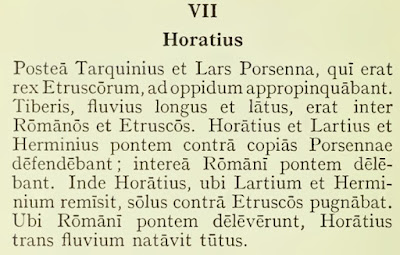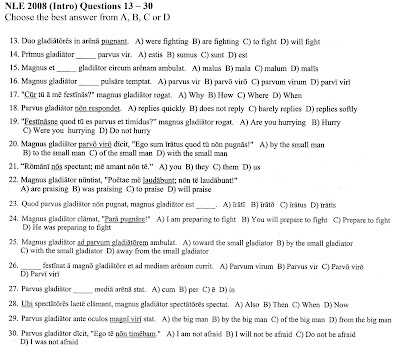https://www.usu.edu/markdamen/latin1000/Chapters/02ch.htm
Hīc non habitat vir. Ibi habitat vir. Hic vir est poēta clārus
et benignus. Casam habet et cūrat. Nunc fēminae in silvā ambulant. Nunc poēta
iānuam aperit et feminās videt. Fēminae rosās portant. Poētae rosās ostendunt
et poēta est laetus quod rosae fēminārum sunt grātae et rosās nōn habet.
Fēminae poētae rosās dant. Poēta fēminīs grātiās agit. Hoc dōnum est poētae
grātum. Nunc iānuam claudit. Rosās cūrat et laudat.
Interdum poēta est in scholā quod amīcus magistrae est. Saepe
fābulās nārrat. In silvā cum discipulīs ambulat quoque. Saepe discipulī cum
poētā ambulāre cupiunt. Poēta est discipulīs cārus. Est benignus quoque. Suntne
poētae tibi benignī? Poētae sunt mihi benignī, sed ego sum magistra. Esne tū
poēta? Pater meus est poēta et in Britanniā habitat. Epistulās patris meī
legere cupiō. Interdum in epistulīs patris sunt dōna. Bene est. Patrī grātiās
agō, quod dōna sunt pecūnia et pictūrae. Ē multīs terrīs pater pictūrās portat.
Pater meus est poēta clārus. Fāma est magna.
Find the Latin; again, take a look at the endings of the nouns
and how those nouns are working in the sentences and phrases:
SINGULAR
[1] Nominative
[i] the noun is peforming the action in the sentence
- The poet opens the door.
- The poet is in school.
[ii] the noun is the predicate e.g. He is a soldier
- This man is a poet.
- I am a teacher.
- Are you a poet?
[2] Genitive: the ‘possessor’ the person, and many other
expressions which translate into English with ‘of’
- The poet is a friend of the teacher.
[3] Dative: the indirect object, the person / thing to
whom / which, for example something is given or for whom / which
something is done
- They show the roses to the poet
- This gift is pleasing to the poet = The poet likes the gift
[4] Accusative: the direct object of the sentence i.e. the
person/ thing that is experiencing the action
- He has a cottage.
- He looks after the cottage.
- The poet opens the door.
- He closes the door.
[5] Ablative: many uses but is often found with prepositions
e.g. in (in / on), cum (with) ē / ex (out of), all of which appear in the text
- He walks …. in the forest.
- The pupils wish to walk with the poet.
PLURAL
[1] Nominative
- The women are walking
[2] Genitive
- The roses of the women [= the women’s roses] are pleasing
[3] Dative
- The poet thanks (is grateful to) the women.
[4] Accusative
- He sees the women.
[5] Ablative
- There are gifts in the letters.
- My father brings pictures from (out of) many countries.



























